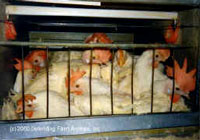According to the rules of the World Trade Organization, governments cannot block the import of a product on the basis of how it is produced. So what if a rainforest has been cut down or a stream polluted or an animal tortured or workers paid pitiful wages? That’s the concern of the producing country, not the consuming one. Consumers should care only that they get what they want as cheaply as possible.
Of course consumers everywhere recognize the ridiculousness of this proposition. We are not robots who just want to plunk down money, get stuff, and take no responsibility for the consequences. Whatever the WTO or any government says, we can exert amazing power by refusing to buy things that are made in ways that violate our values.
Nike, Starbucks, and Home Depot have learned that lesson. Nike found out the hard way that we don’t want athletic shoes made by people who labor under intolerable conditions for pennies per hour. Starbucks has agreed to supply us with organic, shade-grown coffee. (The shade-grown part is to provide winter homes for migrating songbirds.) We have convinced Home Depot not to sell anything made by cutting down old-growth forests.
European supermarkets, pushed by consumer demand, are not only refusing to shelve foods made from genetically modified crops, but are going organic storewide. Frito-Lay has asked suppliers of potatoes and corn for its chips to avoid gene-splicing.

Baby McFry — an Adbusters spoof.
McDonald’s has been hit by consumer protests so often that the company is downright jumpy trying to foresee our next principled protest. First we refused to buy hamburgers packaged in styrofoam that contains ozone-destroying chemicals. Next it was South American beef grazed on pastures carved from rainforest. Now McDonald’s has joined Frito-Lay in asking its suppliers to phase out genetically engineered spuds. They will still be fried in oil from gene-spliced soybeans; apparently McDonald’s hasn’t noticed that yet, or hopes that we haven’t.
Recently McDonald’s responded to consumer power in another arena. This one company buys 1.5 billion eggs a year. McDonald’s has just asked its egg suppliers to pay attention to the living conditions of their hens. The birds must be kept in larger cages. (A skeptical farmer tells me the cages will be increased from the size of a Kleenex box to the size of a brownie pan.) They must no longer be “debeaked,” a practice that keeps closely confined birds from pecking each other. And they must not have food or water withheld to increase egg production.
Animal rights activists have forced these changes. They’re out to stop the inhumane practices of factory farms, where calves, pigs, or chickens are treated more like interchangeable machines than like living creatures. More power to the animal rights folks. But if we’re going to direct consumer power toward factory farming, there’s still a long way to go. We should aim above all to eliminate the use of antibiotics in animal feed.
When you cram a hundred thousand hens together in Kleenex-box-sized or even brownie-pan-sized cages, you create a perfect environment for the transmission of diseases. The same goes for beef and hog feedlots (and people in airplanes). The solution to this problem has been to lace the feed with antibiotics. About 23 million pounds of antibiotics are fed to animals in the United States every year — not used for sick animals, but fed to well ones.

Chickens are all cooped up.
Photo: Defending Farm Animals.
Jamming animals together is bound to spread disease. Keeping them in the constant presence of low-level antibiotics is bound to spread antibiotic-resistant disease. Our animal factories are active sources of drug-resistant salmonella and E. coli and other microbes, some of which infect people. In Europe and America, where animal factories are widespread, people are showing up in hospitals with infections that are resistant to four or five different antibiotics. In the U.S. 14,000 deaths per year are attributed to drug-resistant microbes.
It is crazy to undermine the effectiveness of antibiotics, the greatest health breakthrough of the 20th century, just to make cheaper meat. Doctors are pleading for the control of antibiotics in the meat industry. Both the U.S. Centers for Disease Control and the World Health Organization have issued stern warnings, which in the U.S. have not been turned into government regulation. Meat producers are major campaign contributors.
Raising animals in concentration camps is a bad idea for a dozen reasons, ranging from cruelty to drug resistance to unmanageable manure piles. If we don’t end this practice, it will end itself, when antibiotics can no longer stave off diseases. If we would like to keep antibiotics effective, consumer action is the only way to go (short of campaign finance reform).
There are still farms that raise animals in natural, healthy conditions, with space, light, and movement, and without feeding antibiotics. Turn your consumer power in their direction. Wherever you buy meat or eggs, be willing to ask: Where does this come from? How was it raised? Ask loudly. Ask at McDonald’s.

